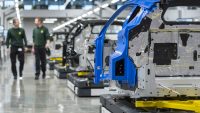New car production grew for the third month in a row in April as the industry continues to recover from crippling semiconductor shortages.
That is according to new data from the Society of Motor Manufacturers and Traders (SMMT) which has published its latest figures.
The statistics show that 66,527 cars rolled off of British production lines in the fourth month of the year – a year-on-year rise of 5,973 units, or 9.9 per cent.
The SMMT says that the rise in volumes was largely driven by an increase in exports, which rose 14.7 per cent to 54,820 – the third month in a row they saw a double-digit rise.
Overall, more than eight in ten of the cars (82. per cent) built in Britain in April were shipped overseas, with more than half (58.4 per cent) heading to the European Union. Other major destinations included the US, China and Australia.
When it came to green cars, UK factories continued to turn out increasing numbers of EVs and hybrids with combined volumes up 56.2 per cent last month, representing well over a third of all production (37.7 per cent).
So far this year, manufacturers have made 113,315 alternatively fuelled cars as numbers continue to ramp up ahead of the 2030 ban on new petrol and diesel vehicles.
Reacting to the latest figures, Mike Hawes, SMMT chief executive, said: ‘UK car production is starting to motor again, good news for the sector and the many thousands of jobs and livelihoods it sustains.
‘These figures also show how exports, particularly to Europe, continue to be the foundation of British automotive manufacturing so we must do all we can to safeguard the competitiveness of these trading relationships.
‘Most immediately, this means finding a solution to the rules of origin challenge faced by manufacturers on both sides of the Channel, else we risk the application of tariffs – and therefore unnecessary cost – on the very vehicles we are trying to encourage consumers to purchase.’
What does the industry say?
What Car? editor Steve Huntingford:
‘It’s very encouraging to see output on the rise, because we know from our own surveys of in-market car buyers that a significant portion of UK consumers are keen to buy British-made cars.
‘In doing so, they support an industry which is a £14.1bn contributor to the economy.
‘The long-term health of the industry does remain in doubt, though, with a coherent industrial strategy over electric vehicle battery manufacturing crucial if the government is to preserve a healthy environment for those buyers who want to make the most of our domestic production expertise.’
Hugo Griffiths, consumer editor at carwow:
‘A 10 per cent increase in performance is a strong improvement by any metric, so while car manufacturing has taken hit after hit in the past where parts supply and production capabilities are concerned, putting more than 66,000 cars together in the UK in April is an incontrovertible sign that things are improving.
‘Also improving is the European Union’s appetite for British-built cars.
‘The third consecutive month of double-digit growth in this area highlights just how important it is that policy makers put their heads together to solve the looming rules of origin crisis, which looks set to hit car makers on both sides of the channel if remedial measures are not taken by the end of the year.’
Richard Peberdy, UK head of automotive for KPMG:
‘The UK car industry’s post-pandemic recovery continues, with export growth a major factor – primarily driven by demand from European markets.
‘As has recently been voiced, the car industry in the UK and Europe is becoming increasingly concerned about changes to rules of origin when 2024 begins.
‘The need for a higher percentage of an electric vehicle to be sourced from within the UK or EU poses significant challenge, especially as battery production is still in its infancy within Europe.
‘Over half of the vehicles produced in the UK in April were electric in some form, so the importance of a solution that avoids tariffs being applied to vehicles is clear.’



































